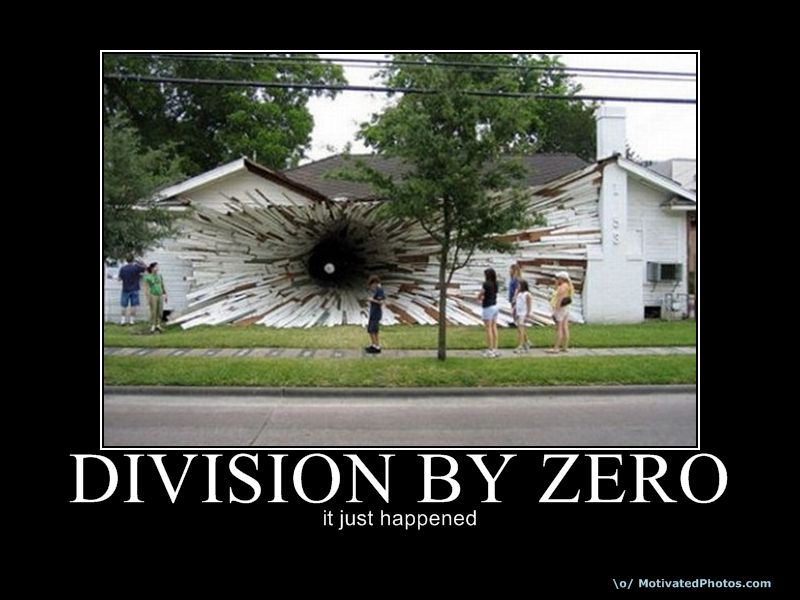Do you have a calculator application on your computer?Drakmeire said:Neither, you can't divide 0 by 2 or any other number.
Do I win?
is 0 even or odd?
- Thread starter Drakmeire
- Start date
0.9*recurring is not equal to 1 because no matter how infinitesimally small the difference is, the difference exists.
And 0 is a number and a digit and an integer (ask any programmer) and it IS even.
And 0 is a number and a digit and an integer (ask any programmer) and it IS even.
Oh and all the divide by zero jokes can fuck off, everyone has so far been talking about dividing zero by other values, which is still possible just highly pointless.
I.E 0/x = 0 EVERY TIME
I.E 0/x = 0 EVERY TIME
just like 0 is neither a possitive number or a negative number, its neither an even or odd number..
That's not odd either.Purple Shrimp said:1.2willsham45 said:Anything ending in 02468 so 0 is even.
Except that it would take you infinity to get to the difference... and thus the difference would never appear.flaming_ninja said:0.9*recurring is not equal to 1 because no matter how infinitesimally small the difference is, the difference exists.
Unlike Achilles and the Turtle the proof isn't actually disproved by anything in the physical world (and thus not a paradox).
Yes you can, but it always equals zero, you cannot do the reverse, which is divide other values by zero, or zero by zero.Daniel Holst Hviid said:just like 0 is neither a possitive number or a negative number, its neither an even or odd number.. even numbers can be devided by 2, and still give a whole number, and you cant devide 0 with anything
Appear, what do you mean appear?4li3n said:Except that it would take you infinity to get to the difference... and thus the difference would never appear.flaming_ninja said:0.9*recurring is not equal to 1 because no matter how infinitesimally small the difference is, the difference exists.
Unlike Achilles and the Turtle the proof isn't actually disproved by anything in the physical world (and thus not a paradox).
I mean you'd never get to it, just like infinity.flaming_ninja said:Appear, what do you mean appear?
It would never come into existence.
So while they're two different numbers, their value in the real world would be the same for infinity time... so even if the universe never ends you never get to see any difference.
It's not a physical thing you can't get to 4 either.4li3n said:I mean you'd never get to it, just like infinity.flaming_ninja said:Appear, what do you mean appear?
10 * 0.9*recurring = 9.9*recurring. (simply switch the decimal point one place as always when multiplying by ten)flaming_ninja said:0.9*recurring is not equal to 1 because no matter how infinitesimally small the difference is, the difference exists.
9.9*recurring - 0.9*recurring = 9. (beyond the decimal point these numbers are identical.)
10 * 0.9*recurring - 0.9*recurring = 9 * 0.9*recurring = 9. (10 * a - a = 9 * a. By the definition of multiplication.)
9 * 0.9*recurring = 9 * 1.
0.9*recurring = 1.
No difference at all. Not even an infinitely small one.
To those saying it isn't an integer... it is.
Zero is just as much a number as one or two. It's infinity that's the "concept rather than a number".
It's even by definition. The true question would be "is it positive or negative", to which the answer *would* be "neither".
Zero is just as much a number as one or two. It's infinity that's the "concept rather than a number".
It's even by definition. The true question would be "is it positive or negative", to which the answer *would* be "neither".
I don't see why people always use this proof when proving 0.99... = 1. do people not like sequences and series?Hagi said:10 * 0.9*recurring = 9.9*recurring. (simply switch the decimal point one place as always when multiplying by ten)flaming_ninja said:0.9*recurring is not equal to 1 because no matter how infinitesimally small the difference is, the difference exists.
9.9*recurring - 0.9*recurring = 9. (beyond the decimal point these numbers are identical.)
10 * 0.9*recurring - 0.9*recurring = 9 * 0.9*recurring = 9. (10 * a - a = 9 * a. By the definition of multiplication.)
9 * 0.9*recurring = 9 * 1.
0.9*recurring = 1.
No difference at all. Not even an infinitely small one.
Beyond the decimal point these numbers are identical 1.2 and 3.2Hagi said:10 * 0.9*recurring = 9.9*recurring. (simply switch the decimal point one place as always when multiplying by ten)flaming_ninja said:0.9*recurring is not equal to 1 because no matter how infinitesimally small the difference is, the difference exists.
9.9*recurring - 0.9*recurring = 9. (beyond the decimal point these numbers are identical.)
10 * 0.9*recurring - 0.9*recurring = 9 * 0.9*recurring = 9. (10 * a - a = 9 * a. By the definition of multiplication.)
9 * 0.9*recurring = 9 * 1.
0.9*recurring = 1.
No difference at all. Not even an infinitely small one.
My 5 fingers on my hand disagree...flaming_ninja said:It's not a physical thing you can't get to 4 either.
Because it works? Unless you wish to argue that f(x)=9x isn't a bijective function or that g(x) =10x-x does not equal f(x)?Glademaster said:I don't see why people always use this proof when proving 0.99... = 1. do people not like sequences and series?
WORST.REASON.EVER!!!Hagi said:Because it works?Glademaster said:I don't see why people always use this proof when proving 0.99... = 1. do people not like sequences and series?
And since they're equal beyond the decimal point they make a whole number when subtracting the smaller one from the larger one, namely 2.flaming_ninja said:Beyond the decimal point these numbers are identical 1.2 and 3.2

